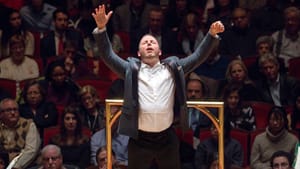Stay in the Loop
BSR publishes on a weekly schedule, with an email newsletter every Wednesday and Thursday morning. There’s no paywall, and subscribing is always free.
Handel's back on his feet
The Philadelphia Orchestra presents Handel’s ‘Messiah’

Another year, another Messiah. The Philadelphia Orchestra’s annual presentation of Handel’s religiously themed oratorio makes a wonderful holiday tradition, with garlands and wreaths festooning Verizon Hall.
But repeated viewings, coupled with attenuated rehearsal time and subpar soloists, can put a damper on the festivities. Last December, I lamented a rather scattershot interpretation and wondered whether it might be time for a new Christmas ritual.
After taking in this season’s offering, conducted by Yannick Nézet-Séguin and featuring several top-shelf singers, I’m prepared to eat my words. Like that other holiday hero, the Grinch, I left the Kimmel Center after the first performance of this run feeling as though my heart had grown three sizes.
More than showpieces
Nézet-Séguin deserves much of the credit for the exemplary musical virtues of this performance. He drew a sharp, focused sound from the small number of players onstage, with especially crisp, distinct playing from the strings. To my ears, his interpretation sounded more idiomatically Baroque than the work of period specialist Emmanuelle Haïm, who led the orchestra in a different set of Handel compositions last month.
Even more pleasing was Nézet-Séguin’s sense of shape and line throughout the work, both musically and dramatically. His fleet pacing reinforced the reality of Messiah as a sustained, text-driven narrative rather than a series of bravura showpieces. Past conductors have let the intervals between aria, recitative, and choral numbers lag, but Nézet-Séguin drove the evening ever forward in a thrilling way.
The opening performance of this run had some special significance — it came just two days after Nézet-Séguin made his official debut as music director of the Metropolitan Opera, conducting La Traviata. Throughout the weekend, he will be back and forth between Philly and New York, conducting performances of both works. Given the boundless energy he displayed on the podium here, the armchair prognosticators who predict burnout from a heavy workload may have to think again.
The coming of the Lord
Among the soloists, French-Canadian bass-baritone Philippe Sly offered everything you could want in this music: beautiful legato, flawless diction, a keen connection to text, and a winning stage presence. His stentorian delivery of the penultimate aria “The trumpet shall sound,” coupled with David Bilger’s reliably excellent horn playing, truly felt like the coming of the Lord.

Jonas Hacker, a recent graduate of Philadelphia’s Academy of Vocal Arts, sang the tenor solos with distinction. His well-produced voice has an almost baritonal coloring that brings out the drama in the music, without sacrificing any of the necessary lightness the part requires. His performance served as an exemplar of the high quality of our local training programs.
British soprano Carolyn Sampson performed the soprano lines with style and technical flair, although the basic tone of her voice tends toward reediness. And for a native English speaker, she too often smudged her words.
All rise
For these performances, the alto part has been assigned to a countertenor, Christophe Dumaux. This is not a new practice — the last time Nézet-Séguin conducted the work here, in 2015, he split duties between Dumaux and mezzo-soprano Karen Cargill — but it is one that I find ill advised.
Dumaux’s basic sound lacked a rich resonance in the lower register, which forced him to constantly transpose phrases up into his comfort zone. This resulted in an unwanted hollowness, particularly in “He was despised,” the work’s great alto solo. Although Dumaux managed some moments of vocal beauty — I was struck by his interpretation of “Thou art gone up on high” — the feeling of a gimmick never fully left my mind.
The Westminster Symphonic Choir, prepared by Joe Miller, returned once again as chorus, performing with their typically high standard. Their spirit, and the overall quality of the evening, was infectious.
It’s customary for audience members to rise during the Hallelujah Chorus. Last year, the gesture seemed perfunctory. This season, I leapt to my feet.
What, When, Where
George Frideric Handel, Messiah. Yannick Nézet-Séguin, conductor. Carolyn Sampson, soprano; Christophe Dumaux, countertenor; Jonas Hacker, tenor; Philippe Sly, bass-baritone. Westminster Symphonic Choir. The Philadelphia Orchestra. Through December 9, 2018, at the Kimmel Center’s Verizon Hall, 300 S. Broad Street, Philadelphia. (215) 893-1999 or philorch.org.
Sign up for our newsletter
All of the week's new articles, all in one place. Sign up for the free weekly BSR newsletters, and don't miss a conversation.

 Cameron Kelsall
Cameron Kelsall